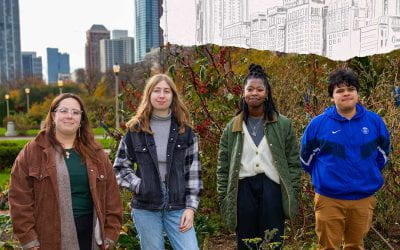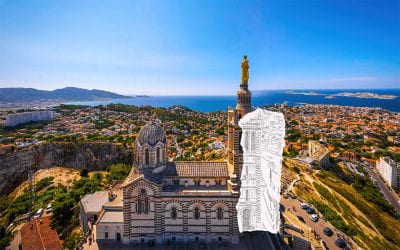Building Leaders for Today’s World
The Legacy of Harold L. WashingtonFaculty Essay by Jacqueline Trussell (BGS ’87), Adjunct Professor of African and African American Studies
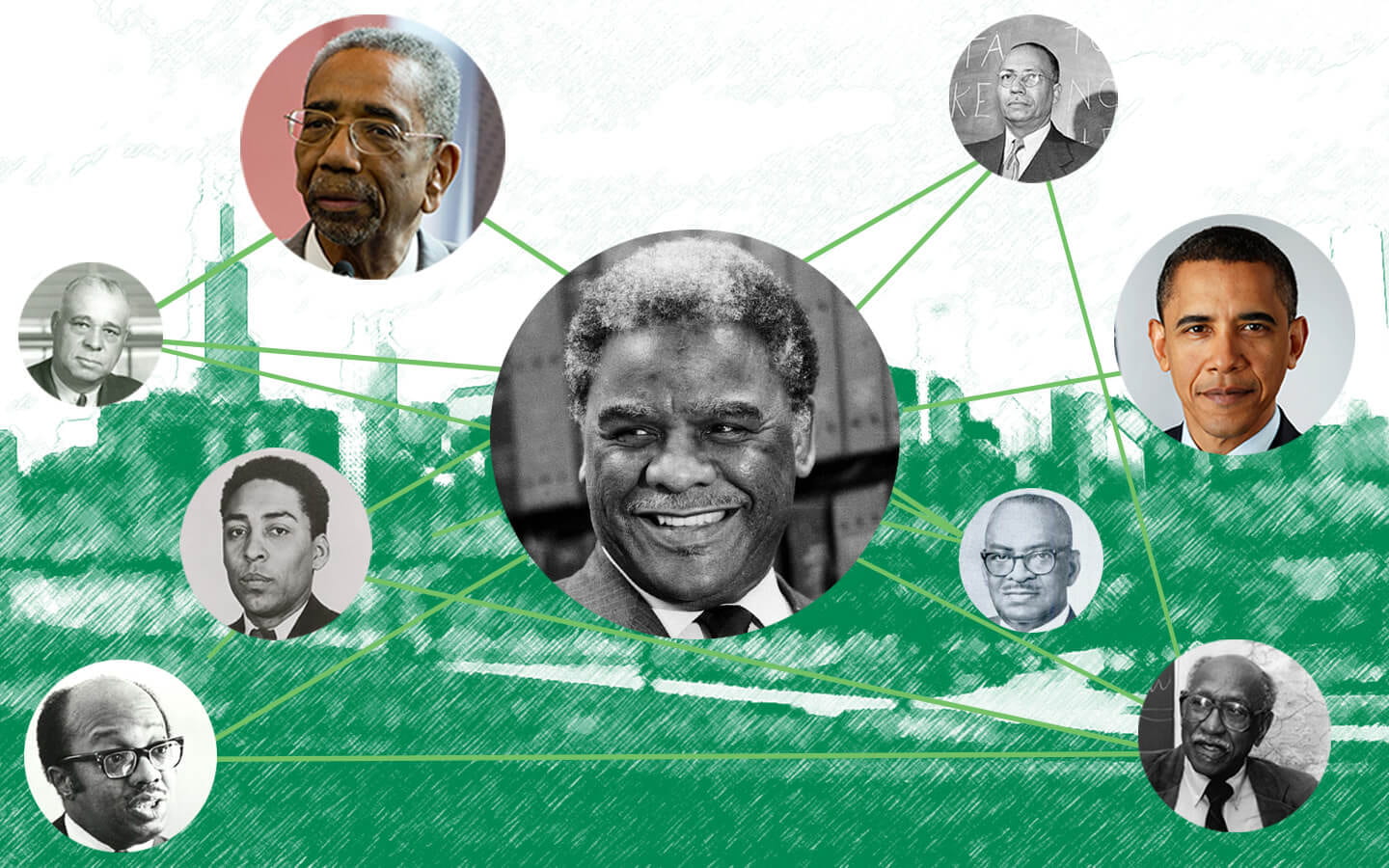
Leaders leave legacies, and Harold Washington (BA Political Science, ’49) left a legacy that continues to inspire.
Anyone who knows anything about politics in Chicago knows that politics and power go together. Washington climbed the ladder of success to become the powerful mayor of the city that had educated him and prepared him for the many roles ahead. Born on April 15, 1922, Washington would have celebrated his 100th birthday in 2022.
Washington’s election as Chicago’s mayor inspired a young man to move to Chicago and begin work as a community organizer. In a 2012 interview, Barack Obama recalls, “I originally moved to Chicago in part because of the inspiration of Mayor Washington’s campaign. I’ll never forget how he reached out to everyone — Black, brown and white — to build a coalition for change. He wasn’t part of the insider crowd. He wasn’t somebody who the establishment immediately embraced.”
The equality experiment: Harold Washington’s formative years
Thanks to his father, Roy, Washington was exposed at an early age to politics. Washington was a product of the Chicago Public Schools system and a military veteran, having served in the U.S. Army from 1942 to 1945. After arriving back in Chicago, Washington enrolled in 1946 in what was sometimes referred to as “The Roosevelt Experiment” because the school had earned a reputation for providing an education to all regardless of race or gender.
Roosevelt had hired St. Clair Drake, a young, Black faculty member and recent University of Chicago graduate. Drake had written a detailed study of Black life in Chicago: Black Metropolis: A Study of Negro Life in a Northern City.
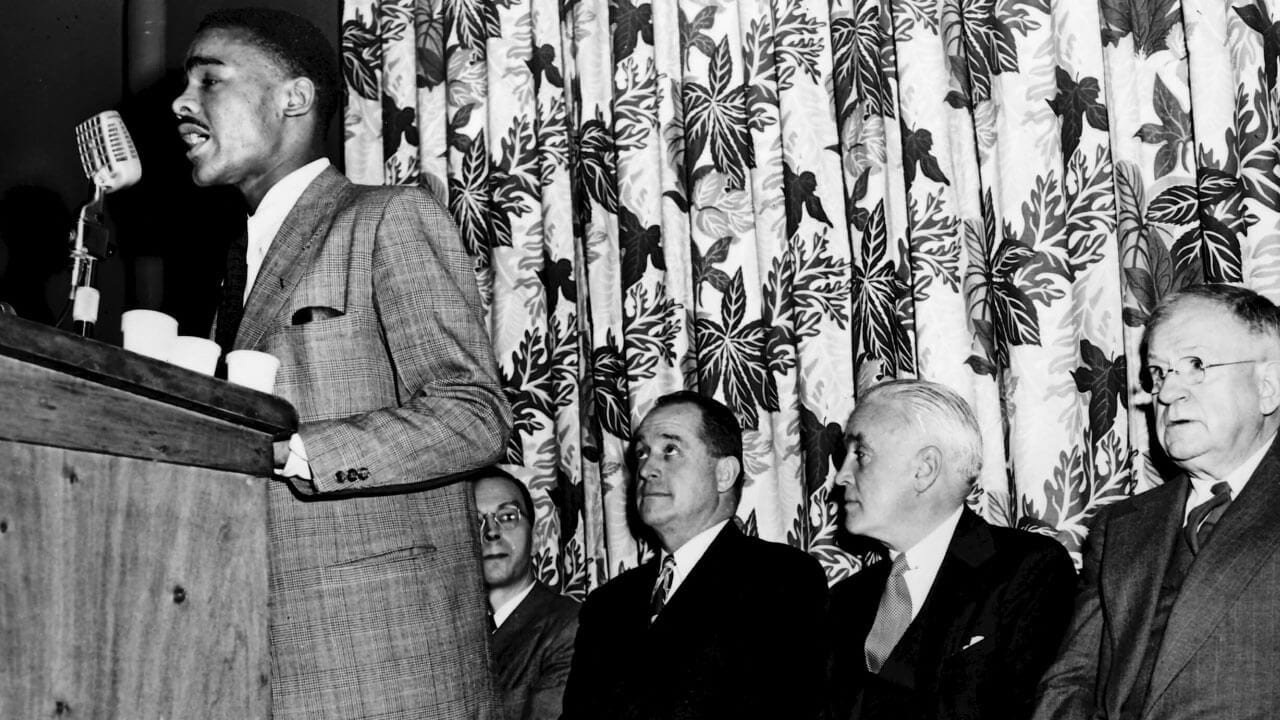
Student council president Harold Washington gives a speech at the University
Drake and linguist Lorenzo Dow Turner created the school’s African and African American Studies program. At Roosevelt, the two hosted scholars and activists from around the country. Washington gained exposure to a variety of intellectual activities, adding to his growth and knowledge of a world beyond the South Side of Chicago where he grew up.
While at Roosevelt, Washington became president of the Student Council, a position that further developed his skills as a leader for all people.
As Washington was graduating from Roosevelt, a young man named Timuel Black (BA Sociology, ’52) entered the school. Black would play a major role in Washington’s election as mayor, along with Washington’s long-time friend, Dempsey Travis (BA Political Science, ’49), a successful real estate developer who helped finance his campaign.
Being a student was only the beginning of what would become a part of his lasting legacy. After graduation in 1949, Washington attended law school at Northwestern University, earning a JD in 1952. During his student years, he worked in various positions for the City of Chicago and worked as an assistant corporation counsel from 1954 to 1958.
Roosevelt University will establish the Harold L. Washington Hall of Honor in fall 2022. This permanent installation will recognize the lifetime achievements of Mayor Washington and other distinguished members of the University community.
“We hope students will be inspired by the greats who came before them,”
said trustee Patricia Harris.
Progressive leadership in Illinois
Washington was elected to the Illinois House of Representatives, where he served from 1965 to 1976, and the Illinois State Senate in 1976-1980. In his service to the State, Washington would enact progressive legislation that was a precursor to his later efforts to do the same in Congress and as mayor. According to Juanita Bratcher’s Harold, his legislative accomplishments included:
- The Consumer Credit Reform Act of 1965.
- Witness Protection Act, 1972.
- The Dr. Martin Luther King, Jr. Holiday Law Act of 1973.
- 1976 grant of $15 million to save Provident Hospital.
- 1979 Human Rights Act.
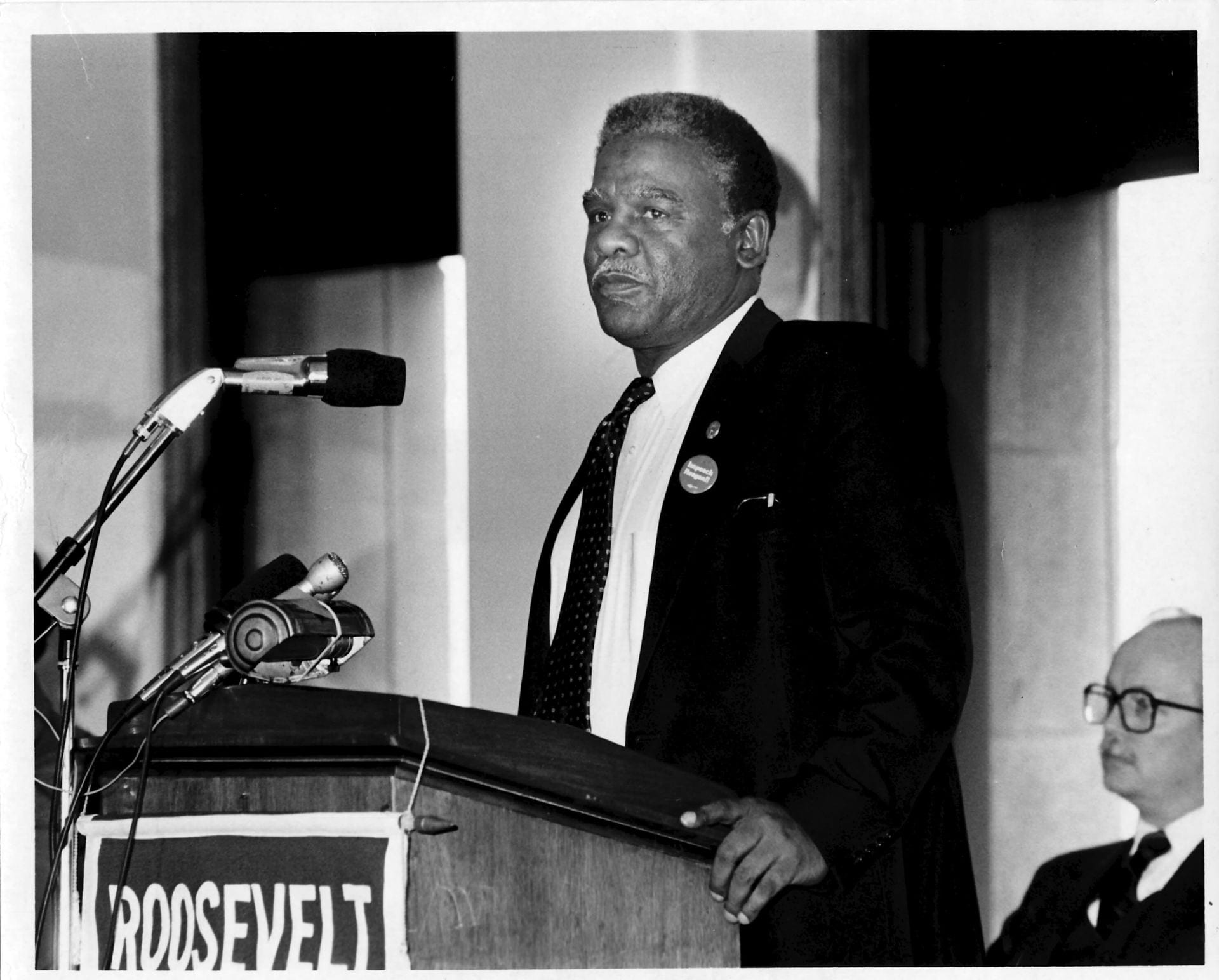
Harold Washington returns to Roosevelt’s campus to give a speech during his mayoral campaign
Washington would continue participating in the city’s Black political leadership, which proved to be a training ground for his political future.
By the time I first met Washington, he had run for political office and was a state representative in the Illinois General Assembly. At Kennedy King Junior (now community college), Washington spoke to my Introduction to Political Science class. He explained to us his role in state government and how it impacts each of us on a daily basis. A master of words, hearing him speak always reminded me of the eloquence of the Rev. Dr. Martin Luther King Jr.
The next time I heard of Washington, he was running for mayor.
Broadening his coalition
In 1977, Washington attempted a run for mayor of Chicago but was defeated. He continued in state politics until he ran a successful campaign for a seat in the U.S. Congress in 1981.
Chicago and Illinois’ First District are important to Black political history. Chicago’s Oscar de Priest was the first African American to be elected to Congress in the 20th century, serving from 1929 to 1935. His successor, Arthur Mitchell, was the only Black person serving in Congress for another eight years. So was his successor, William L. Dawson, when he was first elected in 1942 to the seat Washington would later occupy.
The First Congressional District seat is currently held by Roosevelt alum Bobby L. Rush (BGS ’74). After serving since 1993, Rush will retire at the end of his current term.
In Congress, Washington was instrumental in extending provisions to the 1965 Voting Rights Act and served on three powerful committees: the Judiciary, Education and Labor and Government Operations.
Washington’s politics had been learned at a time when patronage politics reigned supreme. The system showed him that in order for Black people to gain a foothold, change agents had to go against the tide and promote a different brand of politics with policies that could be beneficial to not only his people but to other often-marginalized groups within the city.
With this in mind, Washington broadened his coalition and supported a diverse group of individuals for appointed and elected positions.
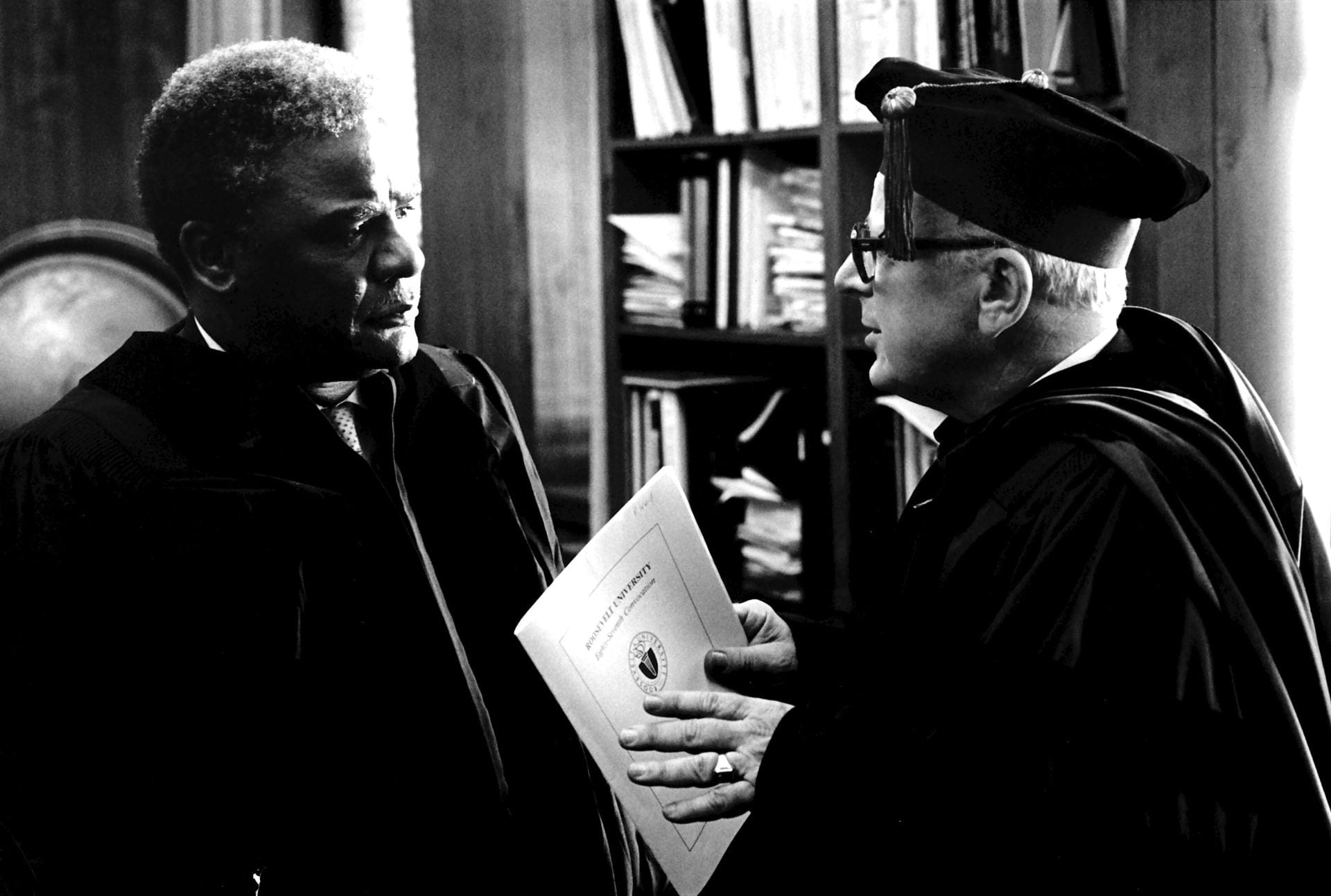
Harold Washington in conversation with Roosevelt President Rolf Weil at the University Commencement Ceremony.
Washington was shaped in an environment where he learned the importance of integrating a social justice ideology into his political framework. His personal and professional accomplishments helped give rise to a form of progressive politics we see today. His death on November 25, 1987 left a void in city politics, yet his work continues to inspire future leaders.
The Harold Washington Legacy Committee is dedicated to ensuring that the world never forgets his impact on the City of Chicago and beyond. The organization plans on awarding scholarships at his alma mater, Roosevelt University.
Students, scholars, politicians and everyday citizens can benefit from knowing and sharing the lasting impact of his legacy.
Jacqueline Trussell (BGS ’87) is an alumna and an adjunct professor in the St. Clair Drake Center for African and African American Studies at Roosevelt University.
More in this section
traveling while home: self-discovery through the local
How can you make the long trip home if you don’t actually leave there? A partnership between Roosevelt University’s Honors Program and Chicago Architecture Center asks students to experience space and place as sites for action—not simply places we passively inhabit.
unexcused absence
Some of life’s most important lessons cannot be taught inside the four walls of a classroom. Matthew Beardmore’s travel has forced him to reassess how he thinks about work, family, politics, injustice and many other issues. He’s no longer tied to the beliefs of where he grew up.
creating a new travel niche while wandering the globe
In early 2011, Sahara Rose De Vore bought a one-way ticket to Costa Rica. Over the next 10 years, she explored 84 countries. The self-discovery she experienced inspired her to launch two successful businesses—both helping others discover the benefits of travel.

